Key takeaways:
- Eco-workshops foster community and empower individuals, leading to lasting changes in sustainable practices.
- Environmental education ignites advocacy for change and stimulates a deeper connection to nature.
- Interactive activities and personal storytelling enhance participant engagement and enrich the learning experience.
- Continuous support and follow-ups after workshops sustain momentum and encourage ongoing community involvement in sustainability.
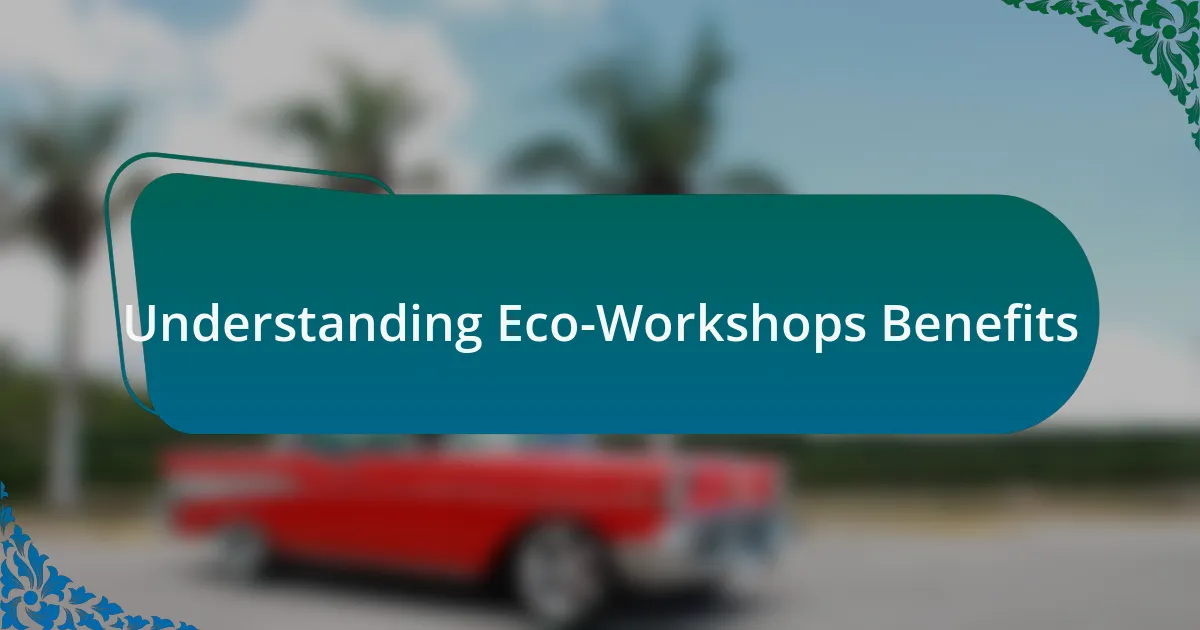
Understanding Eco-Workshops Benefits
I’ve realized that the benefits of eco-workshops extend far beyond just sharing knowledge; they create a community of like-minded individuals. For instance, during one workshop, I witnessed participants connect over shared concerns about environmental sustainability. It struck me how the shared discussions ignited a sense of camaraderie, prompting attendees to exchange ideas even after the event.
Delving into these workshops, I discovered that they empower individuals to make informed decisions. I remember a participant who was initially skeptical about eco-friendly practices but left inspired to implement changes in her daily life. Isn’t it amazing to think about how a single conversation or practical demonstration can shift someone’s perspective?
Ultimately, hosting eco-workshops offers a platform for hands-on learning that encourages sustainable habits. I often see participants leave with not just awareness but also practical tips they can apply immediately. The transformation that occurs right in those moments makes it clear that these workshops do more than educate; they inspire change.
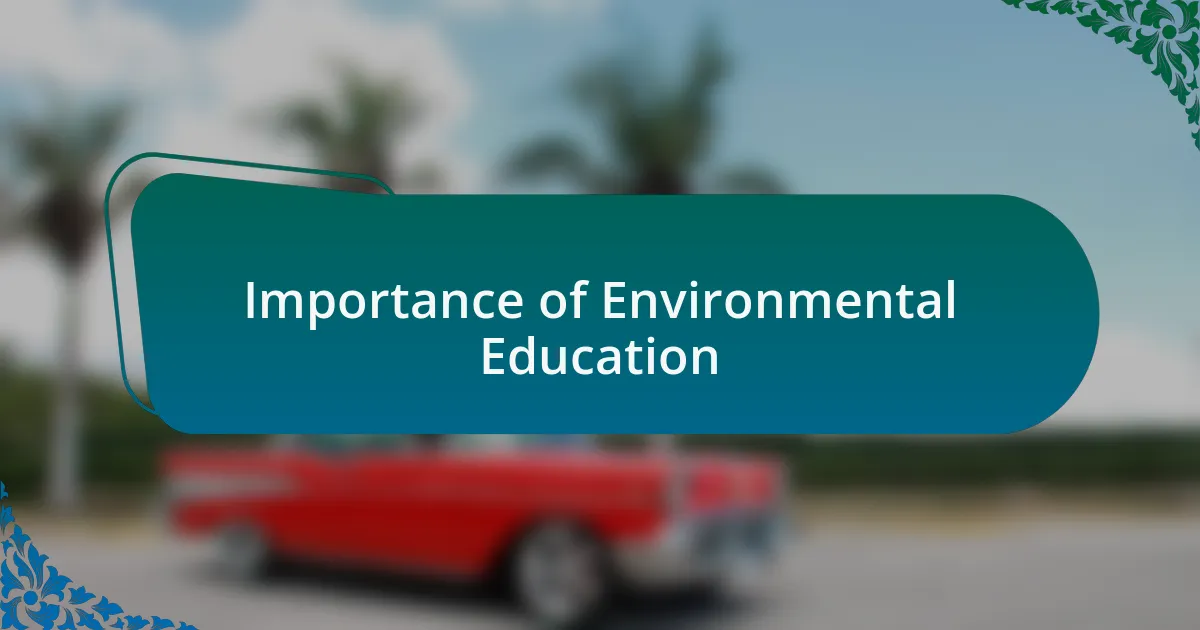
Importance of Environmental Education
Environmental education plays a crucial role in fostering a sustainable mindset. I remember a moment during a workshop when a participant shared how learning about the impact of plastic on our oceans opened her eyes. It was heartening to see how new knowledge ignited a fire within her to advocate for change—what could be more powerful than that?
I’ve often found that understanding environmental issues helps people feel more connected to their surroundings. During a discussion about urban greening, a participant reflected on her childhood memories of playing in the park. That nostalgic connection sparked a conversation about the importance of preserving green spaces, showcasing how education can revive our appreciation for nature. Isn’t it fascinating how learning can bring us back to our roots?
Moreover, empowering others through education can have a ripple effect in our communities. Just the other day, I overheard a workshop attendee discussing recycling tips with her neighbor, using what she had just learned. It made me realize that when we equip individuals with knowledge, they become informal educators themselves. This chain reaction can amplify our efforts toward achieving a more sustainable future.
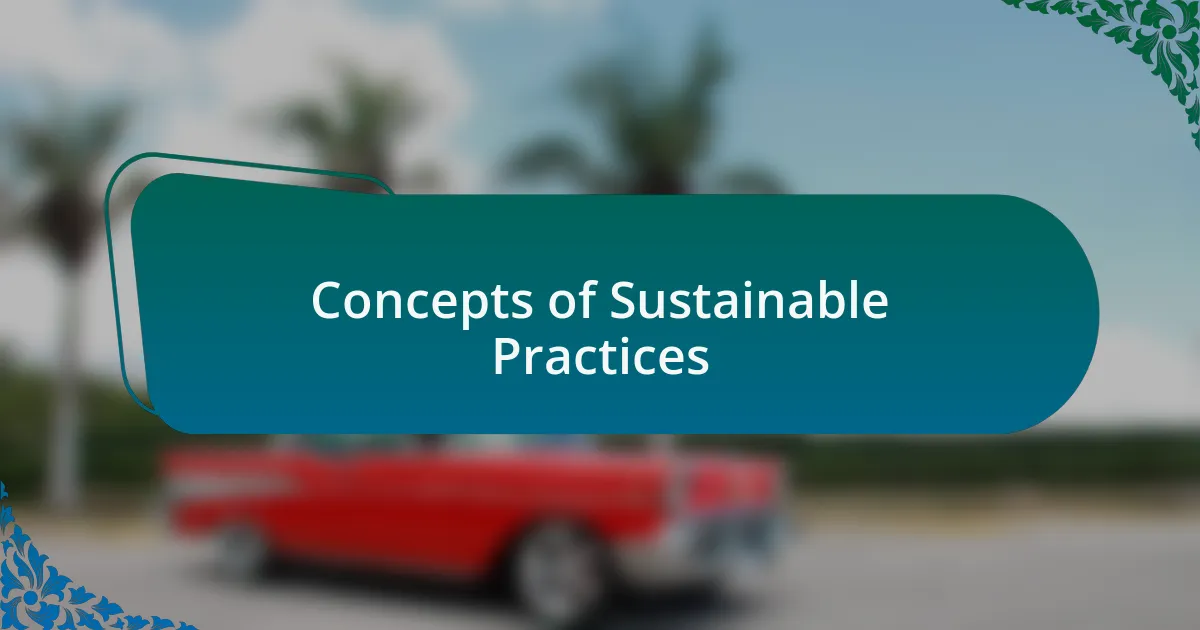
Concepts of Sustainable Practices
Sustainable practices revolve around the idea of minimizing waste and making responsible choices that benefit both the environment and society. I recall leading a workshop where we discussed simple actions like using biodegradable products. One participant excitedly shared how she switched to these alternatives in her daily routine, illustrating how small changes can lead to significant impacts. It’s these personal shifts that truly illustrate the power of sustainability—don’t you think?
Another core concept of sustainable practices is the emphasis on resource conservation. I once witnessed a lively debate during a workshop on water usage; participants shared creative solutions to reduce their consumption. One suggestion that stuck with me was a rainwater harvesting system. The enthusiasm around this idea highlighted how innovative thinking could salvage our most precious resources. After all, what better way to respect our environment than by taking proactive steps to preserve it?
Finally, the concept of community engagement is vital in promoting sustainable practices. At one of my workshops, we created a local clean-up project that brought neighbors together. The joy I saw on their faces as they worked side by side was contagious. Isn’t it incredible how collective efforts can amplify our sustainability goals? Together, communities can cultivate a sense of responsibility and ownership toward the environment, illustrating that we’re all in this together.
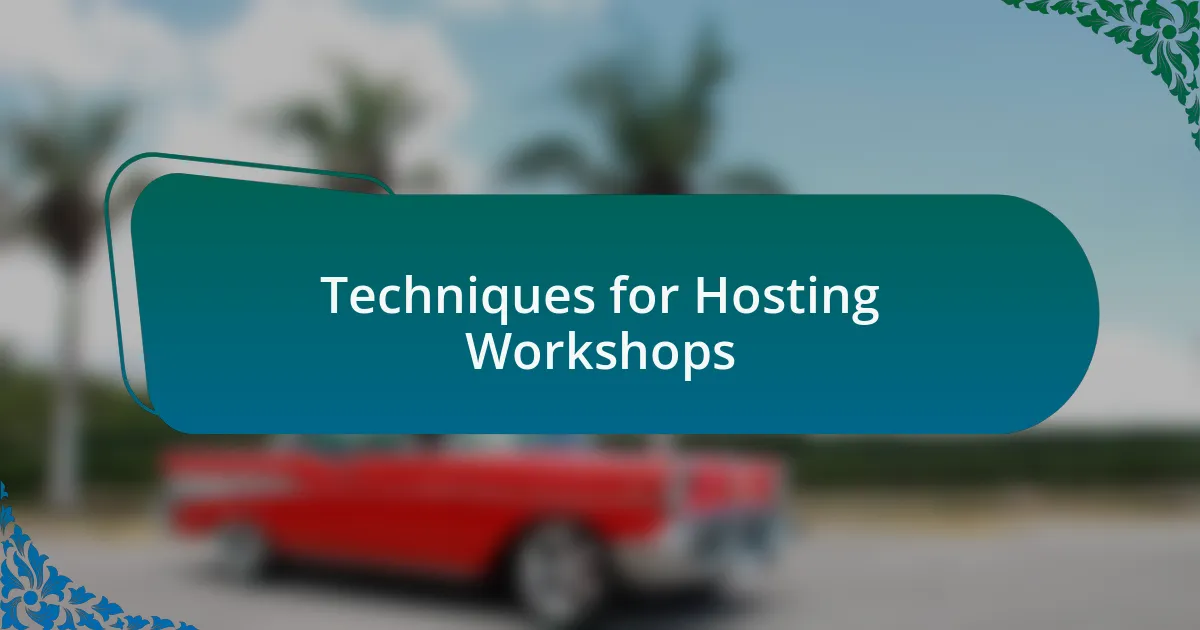
Techniques for Hosting Workshops
Engaging participants is key to a successful workshop, and I’ve found that interactive activities work wonders. During one session, I had attendees create vision boards for their sustainability goals using recycled materials. The energy in the room was palpable as participants expressed their creativity. It’s fascinating how hands-on activities can foster a deeper connection to the subject matter, don’t you think?
Providing clear, actionable takeaways ensures that participants leave with more than just ideas. At a recent workshop, I introduced the “30-Day Green Challenge,” which encouraged attendees to implement one sustainable change each day. I was thrilled to hear feedback that some continued the challenge long after the workshop ended. It’s moments like these that reinforce the idea that sustainability doesn’t have to be overwhelming; it can be approached one step at a time.
Another technique is to create an inclusive atmosphere where everyone’s voice is heard. I remember a workshop where we broke into small groups to discuss local eco-issues—everyone had something valuable to contribute. Watching participants support each other was uplifting, and it struck me how this sense of community enhances learning. How can we harness that support in more settings?
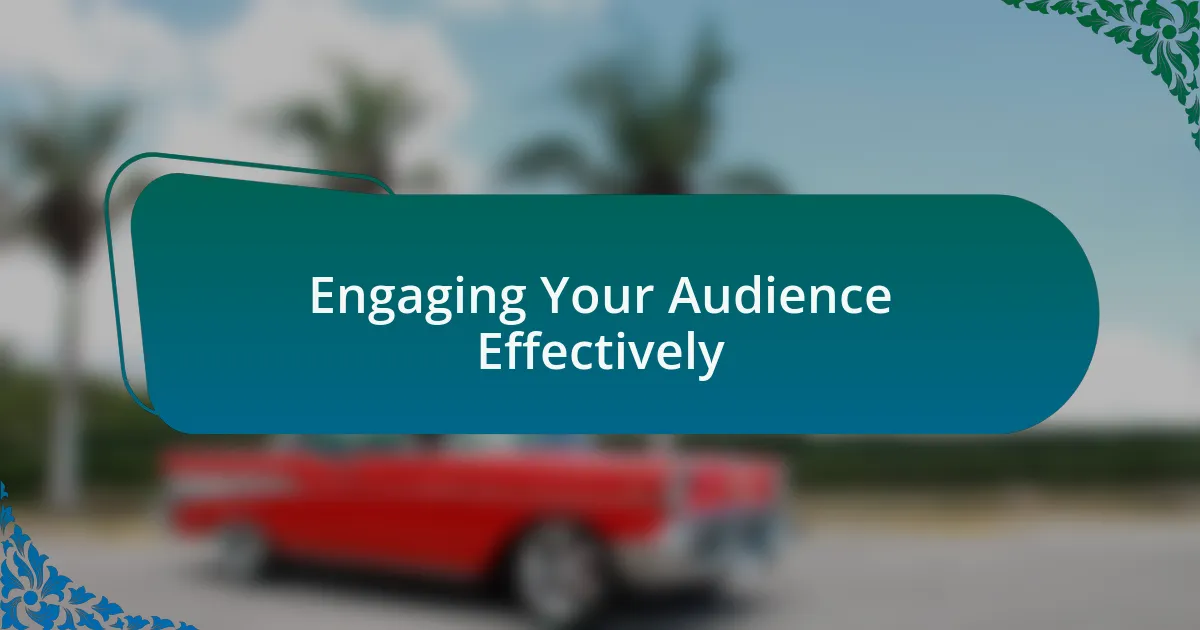
Engaging Your Audience Effectively
One effective way to engage your audience is through storytelling. I remember sharing a personal experience during one of my workshops about the time I transformed my own backyard into a sustainable garden. The moment I described watching the first seeds sprout, I could see participants leaning in, captivated by the visual image. It’s intriguing how personal stories can create an emotional connection, making participants feel invested in the journey toward sustainability.
Using varied formats can also pique interest and maintain focus. In a workshop on eco-friendly car care, I incorporated short video clips showcasing innovative green products in action. The feedback was overwhelmingly positive—attendees expressed that the mix of visual and auditory elements kept the content fresh and engaging. Have you considered how multimedia can enhance your presentations and capture attention more effectively?
Lastly, asking open-ended questions throughout the session encourages dialogue and keeps participants engaged. I found that during discussions, when I posed thought-provoking questions like, “What’s one change you’d like to see in your community?” participants eagerly shared their perspectives. This back-and-forth not only fosters a sense of community but also enriches the learning experience, making it feel collaborative rather than one-sided. How can we create more spaces for this kind of interaction in our workshops?
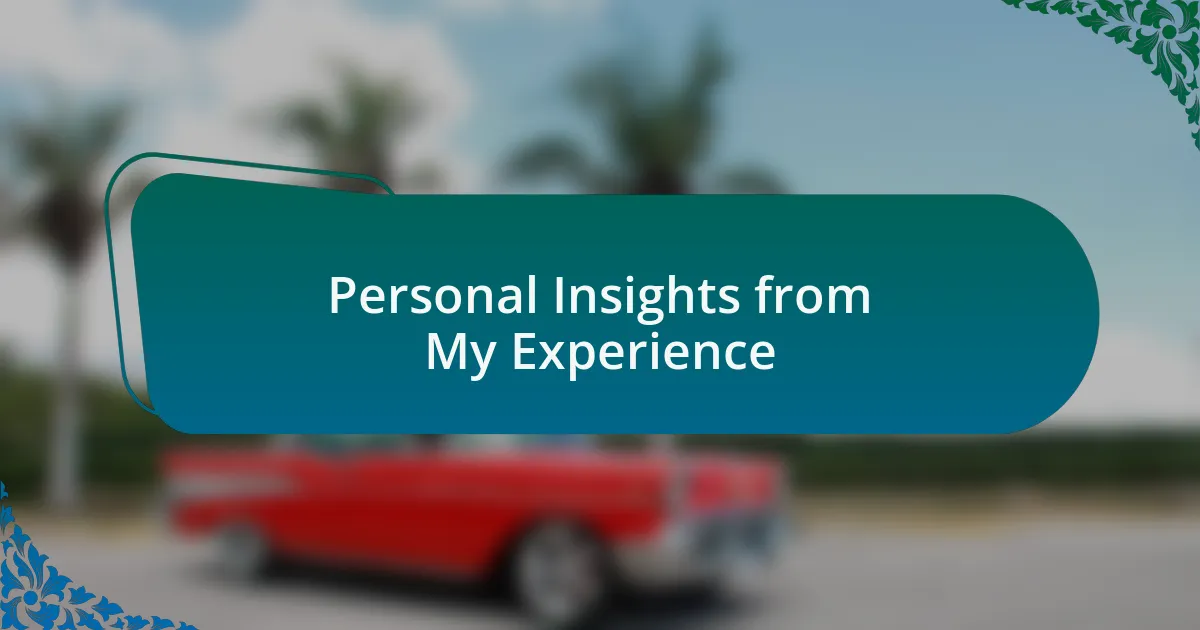
Personal Insights from My Experience
Hosting eco-workshops has truly broadened my perspective on community engagement. One memorable moment was when a participant shared how a simple tip I provided led them to reduce plastic waste in their daily routine. Hearing their transformation stories reminded me just how powerful knowledge can be—it really fueled my commitment to these workshops.
Through my experiences, I’ve come to realize that everyone has their unique journey toward sustainability. I vividly recall a participant who started a small eco-group in their neighborhood after leaving one of my sessions. It made me think: how much potential lies within each individual to ignite change? It’s inspiring to see that ripple effect take shape, often stemming from a single conversation.
Additionally, I found that sharing my own failures was just as impactful as conveying successes. I once struggled to implement a zero-waste strategy in my own life, often feeling overwhelmed and defeated. When I opened up about this challenge during a workshop, I was surprised at how many attendees resonated with that vulnerability. It made me ponder: are we sometimes too focused on perfection? These honest conversations about the ups and downs of the eco-journey can truly foster authentic connections among participants.
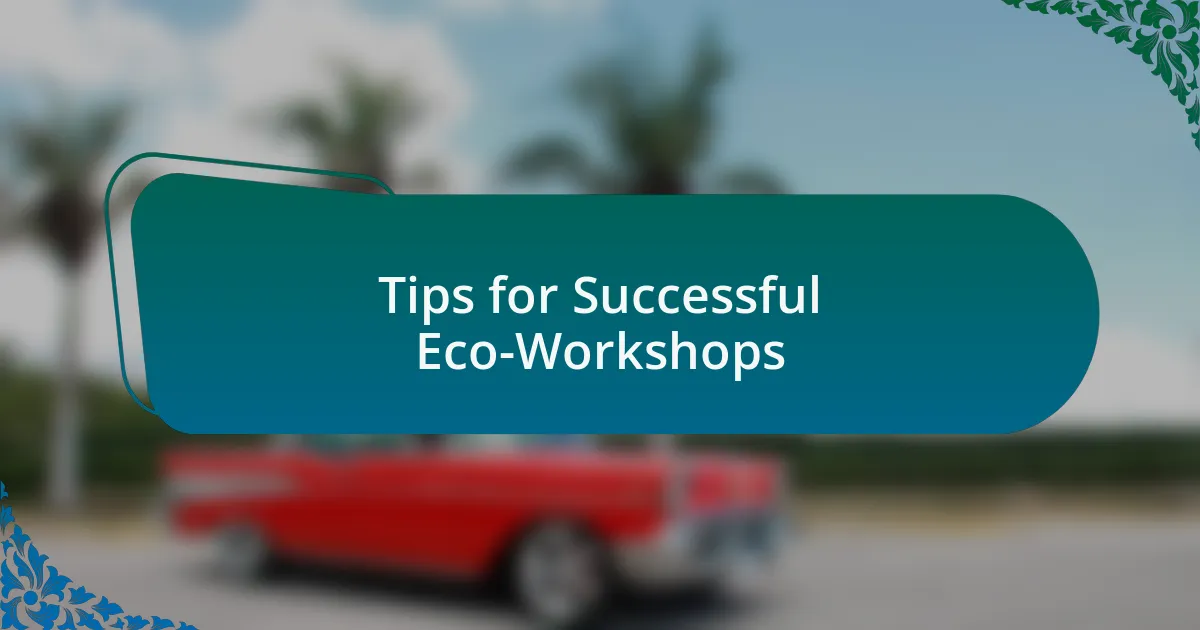
Tips for Successful Eco-Workshops
To ensure your eco-workshops resonate with participants, consider tailoring your content to reflect their interests and backgrounds. I recall one workshop where I gathered input on what topics excited attendees before diving into discussions. This approach not only made the sessions more engaging but also created a sense of ownership among participants. Isn’t it fascinating how a few targeted questions can unlock meaningful dialogue?
Another practice I’ve found invaluable is incorporating hands-on activities that spark creativity and collaboration. During one workshop, we organized a DIY upcycling project where participants transformed old t-shirts into reusable shopping bags. Watching their excitement as they proudly displayed their creations reminded me of the joy that comes from direct involvement. How can we amplify that sense of creativity in future sessions?
Lastly, follow-ups are crucial for sustaining the momentum generated during your workshops. After one particularly impactful session, I sent out a simple email asking for feedback and offering additional resources. The responses were heartwarming—many attendees expressed renewed commitment to their eco-initiatives and even formed a study group to continue learning together. It opened my eyes to the power of nurturing relationships beyond the event. Have you considered how continuous support could enhance your workshop’s impact?